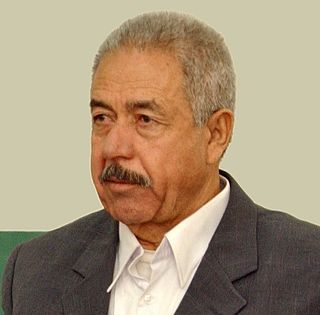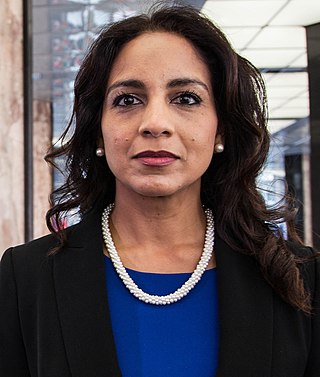Related Research Articles
Universal jurisdiction is a legal principle that allows states or international organizations to prosecute individuals for serious crimes, such as genocide, war crimes, and crimes against humanity, regardless of where the crime was committed and irrespective of the accused's nationality or residence. Rooted in the belief that certain offenses are so heinous that they threaten the international community as a whole, universal jurisdiction holds that such acts are beyond the scope of any single nation's laws. Instead, these crimes are considered to violate norms owed to the global community and fundamental principles of international law, making them prosecutable in any court that invokes this principle.

Under the Arab Socialist Ba'ath Party, Iraq's human rights record was considered one of the worst in the world. Secret police, state terrorism, torture, mass murder, genocide, ethnic cleansing, rape, deportations, extrajudicial killings, forced disappearances, assassinations, chemical warfare, and the destruction of the Mesopotamian marshes were some of the methods Saddam Hussein and the country's Ba'athist government used to maintain control. Saddam committed crimes of aggression during the Iran–Iraq War and the Gulf War, which violated the Charter of the United Nations. The total number of deaths and disappearances related to repression during this period is unknown, but is estimated to be at least 250,000 to 290,000 according to Human Rights Watch, with the great majority of those occurring as a result of the Anfal genocide in 1988 and the suppression of the uprisings in Iraq in 1991. Human Rights Watch and Amnesty International issued regular reports of widespread imprisonment and torture.

Colonel General Ali Hassan Majid al-Tikriti, was an Iraqi military officer and politician under Saddam Hussein who served as Defense minister, Interior minister, and chief of the Iraqi Intelligence Service. He was also the governor of Kuwait during much of the 1990–91 Gulf War.

Dame Vera Baird is a British barrister and politician who has held roles as a government minister, police and crime commissioner, and Victims' Commissioner for England and Wales.

Human rights in post-invasion Iraq have been the subject of concerns and controversies since the 2003 U.S. invasion. Concerns have been expressed about conduct by insurgents, the U.S.-led coalition forces and the Iraqi government. The U.S. is investigating several allegations of violations of international and internal standards of conduct in isolated incidents by its own forces and contractors. The UK is also conducting investigations of alleged human rights abuses by its forces. War crime tribunals and criminal prosecution of the numerous crimes by insurgents are likely years away. In late February 2009, the U.S. State Department released a report on the human rights situation in Iraq, looking back on the prior year (2008).
The Iraqi High Tribunal (IHT), formerly the Iraqi Special Tribunal and sometimes referred to as the Supreme Iraqi Criminal Tribunal, is a body established under Iraqi national law to try Iraqi nationals or residents accused of genocide, crimes against humanity, war crimes or other serious crimes committed between 1968 and 2003. It organized the trial of Saddam Hussein and other members of his Ba'ath Party regime.

The Anfal campaign was a counterinsurgency operation which was carried out by Ba'athist Iraq from February to September 1988 during the Iraqi–Kurdish conflict at the end of the Iran–Iraq War. The campaign targeted rural Kurds because its purpose was to eliminate Kurdish rebel groups and Arabize strategic parts of the Kirkuk Governorate. The Ba'athist regime committed atrocities on the local Kurdish population, mostly civilians.
Kurdish women have traditionally played important roles in Kurdish society and politics. In general, Kurdish women's rights and equality have improved dramatically in the 21st century due to progressive movements within Kurdish society. However, despite the progress, Kurdish and international women's rights organizations still report problems related to gender inequality, forced marriages, honor killings, and in Iraqi Kurdistan, female genital mutilation (FGM).
Guglielmo Verdirame, Baron Verdirame, is a legal scholar, barrister and a member of the House of Lords.
Kurds have had a long history of discrimination perpetrated against them by the Turkish government. Massacres have periodically occurred against the Kurds since the establishment of the Republic of Turkey in 1923. Among the most significant is the massacre that happened during the Dersim massacre, when 40,000-70,000 civilians were killed by the Turkish Army and 11,818 people were sent into exile. According to McDowall, 40,000 people were killed. The Zilan massacre of 1930 was a massacre of Kurdish residents of Turkey during the Ararat rebellion, in which 5,000 to 47,000 were killed.
The Human Rights Association is an NGO for advancing Human rights in Turkey, founded in 1986 and headquartered in Ankara.

The 1983–1986 Kurdish rebellions in Iraq occurred during the Iran–Iraq War as PUK and KDP Kurdish militias of Iraqi Kurdistan rebelled against Saddam Hussein as part of the Iraqi–Kurdish conflict, in an attempt to form an independent state. With Iraqi government forces occupied by the Iran-Iraq War, Kurdish Peshmerga succeeded in taking control of some enclaves, with Iranian logistic and sometimes military support. The initial rebellion resulted in stalemate by 1985.
The status of women in Iraq has been affected by wars, Islamic law, the Constitution of Iraq, cultural traditions, and secularism. Hundreds of thousands of Iraqi women are war widows, and Women's rights organizations struggle against harassment and intimidation while they work to promote improvements to women's status in the law, in education, the workplace, and many other spheres of Iraqi life. Abusive practices such as honor killings and forced marriages remain problematic.

Nadia Murad Basee Taha is an Iraqi-born Yazidi human rights activist based in Germany. In 2014, during the Yazidi genocide by the Islamic State, she was abducted from her hometown of Kocho in Iraq. Much of her community was massacred. After losing most of her family, Murad was held as an Islamic State sex slave for three months, alongside thousands of other Yazidi women and girls.

Fatimata M'baye is a Mauritanian lawyer. She has campaigned for human rights in her country. In 2016, she was given an International Women of Courage Award by the U.S. Secretary of State.

The Yazidi genocide was perpetrated by the Islamic State in Iraq and Syria between 2014 and 2017. It was characterized by massacres, genocidal rape, and forced conversions to Islam. The Yazidis are a Kurdish-speaking people who are indigenous to Kurdistan who practice Yazidism, a monotheistic Iranian ethnoreligion derived from the Indo-Iranian tradition.

Yazda: Global Yazidi Organization, is a United States-based global Yazidi nonprofit, non-governmental organization (NGO) advocacy, aid, and relief organization. Yazda was established to support the Yazidi, especially in northern Iraq, specifically Sinjar and Nineveh Plain, and northeastern Syria, where the Yazidi community has, as part of a deliberate "military, economic, and political strategy," been the focus of a genocidal campaign by ISIL that included mass murder, the separation of families, forced religious conversions, forced marriages, sexual assault, physical assault, torture, kidnapping, and slavery.

The 2018 Nobel Peace Prize was awarded to Denis Mukwege and Nadia Murad "for their efforts to end the use of sexual violence as a weapon of war and armed conflict," according to the Norwegian Nobel Committee announcement on 5 October 2018 in Oslo, Norway. "Both laureates have made a crucial contribution to focusing attention on, and combating, such war crimes," according to the award citation. After reading the citation, Committee Chair Berit Reiss-Andersen told reporters that the impact of this year's award is to highlight sexual abuse with the goal that every level of governance take responsibility to end such crimes and impunities.

Luke John de Pulford is a human rights campaigner, particularly in the areas of modern slavery and human rights abuses in China. In 2015, de Pulford co-founded Arise, which he led until 2022. He is the founder and Executive Director of the Inter-Parliamentary Alliance on China, which he co-founded with leading legislators from eight legislatures in 2020. De Pulford is also co-founder of the Coalition for Genocide Response, sits as a Commissioner on the Conservative Party Human Rights Commission, advises the World Uyghur Congress, and is the trustee of several charities.

Parosha Chandran is a Professor of Practice in Modern Slavery Law in The Dickson Poon School of Law, King's College London. She is also a human rights barrister at One Pump Court and an expert advisor on human trafficking law for the United Nations and the Council of Europe.
References
- ↑ Matthew Tempest (8 September 2005). "'We've shaken off the silly tag'". guardian.co.uk. Retrieved 3 September 2010.
- ↑ "Journalism Weekly". Viewer.zmags.com. 14 September 2013. Retrieved 12 March 2017.
- ↑ "Hugo Charlton, barrister and broadcaster on Vimeo". Vimeo.com. 9 November 2011. Retrieved 12 March 2017.
- ↑ Morgan, David (27 February 2005). "Free the Kurdish politician Remzi Kartal". KurdishMedia.com. Archived from the original on 7 August 2011.
- ↑ "Kurdish Genocide Task Force". Uk.gov.krd. Retrieved 12 March 2017.
- ↑ "Widows for Peace through Democracy". Widowsforpeace.org. 11 February 2017. Retrieved 12 March 2017.
- ↑ Wheeler, Brian (10 June 2005). "Where next for the Green Party?". BBC News.
"We played the electoral game and the system has well and truly stuffed us," says Mr Charlton with a smile.
- ↑ Wade, Alex (16 September 2003). "Was the Iraq war illegal?". The Guardian.
One defence to a criminal charge is that the accused was acting to prevent a crime. Hugo Charlton, the barrister defending Jones and Milling, concedes that his clients' arguments are rarely used. They will say they were acting to prevent the commission of a crime because the B-52s were about to take off from RAF Fairford to take part in an illegal armed conflict, the result of which would be large-scale loss of life and destruction of property in Iraq.
- ↑ "Aldermaston may be in breach of terrorism act". New Wales. 26 September 2002.
- ↑ "Get yourself connected, and get ahead". University of York. Retrieved 25 February 2024.
- 1 2 "Hugo Charlton". Kensington and Chelsea Parliamentary Candidate. Retrieved 14 April 2011.